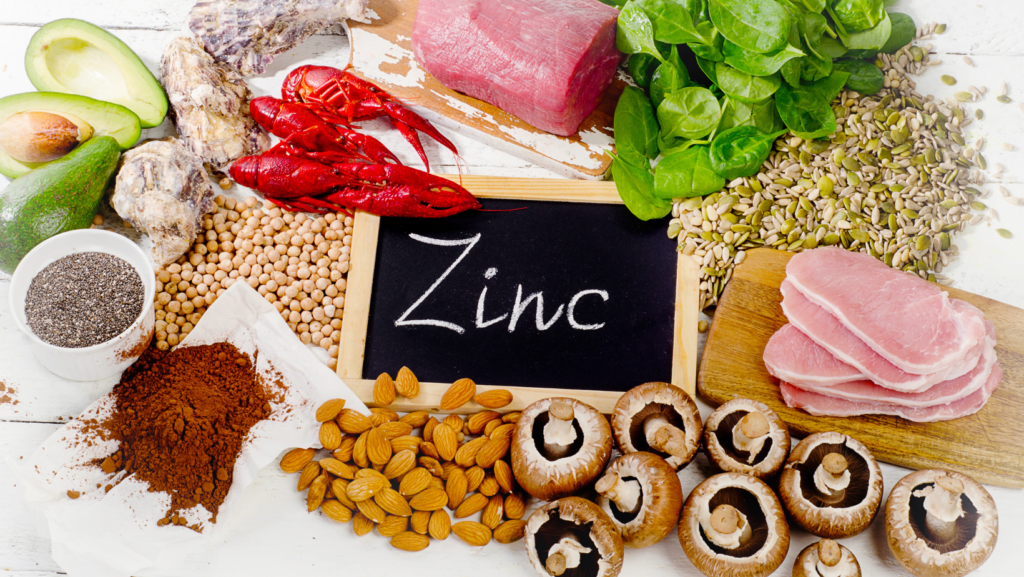Today we are shining the spotlight on Zinc! Read on to learn about why zinc is so important.
What is Zinc?
Zinc is a micronutrient and a mineral that is needed for over 300 enzymes in the body to work properly. You need zinc for growth, reproduction, immunity, digestion, gene expression, protein synthesis and thyroid function. Because zinc is integral for protein synthesis, it plays a particularly important role in keeping our tissues and cells healthy. Zinc acts like a body guard, helping to protect the body from every type of stress from infection and heavy metals to blood sugar dysregulation and emotional stressors.
What foods contain Zinc?
Animal proteins like shellfish (especially oysters), meat, organ meats and dairy (especially cheese) are the most bioavailable food sources of zinc. Plant based sources like cocoa powder, beans, cashews, almonds, oatmeal and pumpkin seeds contain zinc as well, but they contain phytic acid which can bind minerals and impede absorption. In 2001, the Institute of Medicine reported that that individuals getting their zinc only from plant sources may need 50% more due to this.
How much zinc do we need?
Men need 11 mg/day and females need 8 mg/day. Pregnant women need between 11-13 mg/day. Deficiency may manifest as decreased appetite, delayed growth in children, skin irritation/dry skin patches, acne, diarrhea, loss of lean muscle mass and delayed sexual maturation.
Zinc’s Roles in the Body
- Zinc and Thyroid Function
Zinc, Iodine, Tyrosine, Vitamin A and Vitamin E are all needed to manufacture thyroid hormone (T4). Zinc is also needed to convert T4 to its active form, T3.
- Zinc and Blood Sugar
Zinc acts on insulin receptors on our cells to help prevent insulin resistance and diabetes. Zinc has been shown to improve blood sugar regulation due to its interaction with insulin.
- Zinc and Gut Health
Zinc has been shown to increase mucin production and can help cure ulcers in humans. Zinc deficiency is common in those with inflammatory bowel disease due to malabsorption or low dietary intake. Zinc picolinate or zinc citrate appear to be the most well absorbed forms of zinc in supplement form. However, zinc carnosine may be a helpful addition when considering healing increased intestinal permeability. Zinc is also needed to activate many digestive enzymes.
- Zinc and your Immune System
Zinc is very important for white blood cell development and may also have anti-viral properties. It has been shown to stop the cold virus from invading your nose and throat. Look for a zinc acetate lozenge form (Life Extension has a good option) and take at the first sign of a cold!
Zinc’s Interactions with other Micronutrients
- Zinc and Vitamin A
Zinc is needed to carry Vitamin A through the body and therefore plays a role in immunity, vision and cellular communication.
- Zinc and Copper
Zinc and copper compete for absorption. If supplementing with higher doses of zinc, we recommend also taking a small amount of copper (no more than 2 mg generally) as well to keep them in balance.
Should you supplement?
If you choose to supplement with zinc, we recommend looking for zinc in citrate, picolinate or carnosine forms for optimal absorption. We also recommend taking zinc with a small amount of copper (around 1-2 mg) to offset any interactions that may reduce copper levels when zinc is in abundance. People who may benefit from zinc supplementation include vegetarians/vegans, those with diseases marked by malabsorption, older adults, those with GI issues/suspected leaky gut, hypothyroidism or acne. Always work with a trusted professional to see if a zinc supplement is right for you!
Ways to get more zinc:
- Snack on pumpkin seeds or cashews (1/4 cup = 2.5 mg Zinc)
- Add garbanzo beans or lentils to salads, soups or veggie burgers (1 cup = 2.5 mg Zinc)
- Eat oysters! (1 oz. = 24 mg Zinc)
- Grind up organ meats (beef liver has 4.25 mg Zinc per serving) and use with other ground meats for burgers or tacos
- Enjoy shrimp on the grill or in stir fries (4 ounces = 1.8 mg Zinc)
- Roast turkey and eat on wraps or sandwiches during the week (4 ounces = 2 mg Zinc)
- Enjoy overnight oats for breakfast (1/2 cup dry = 1.5 mg Zinc)



